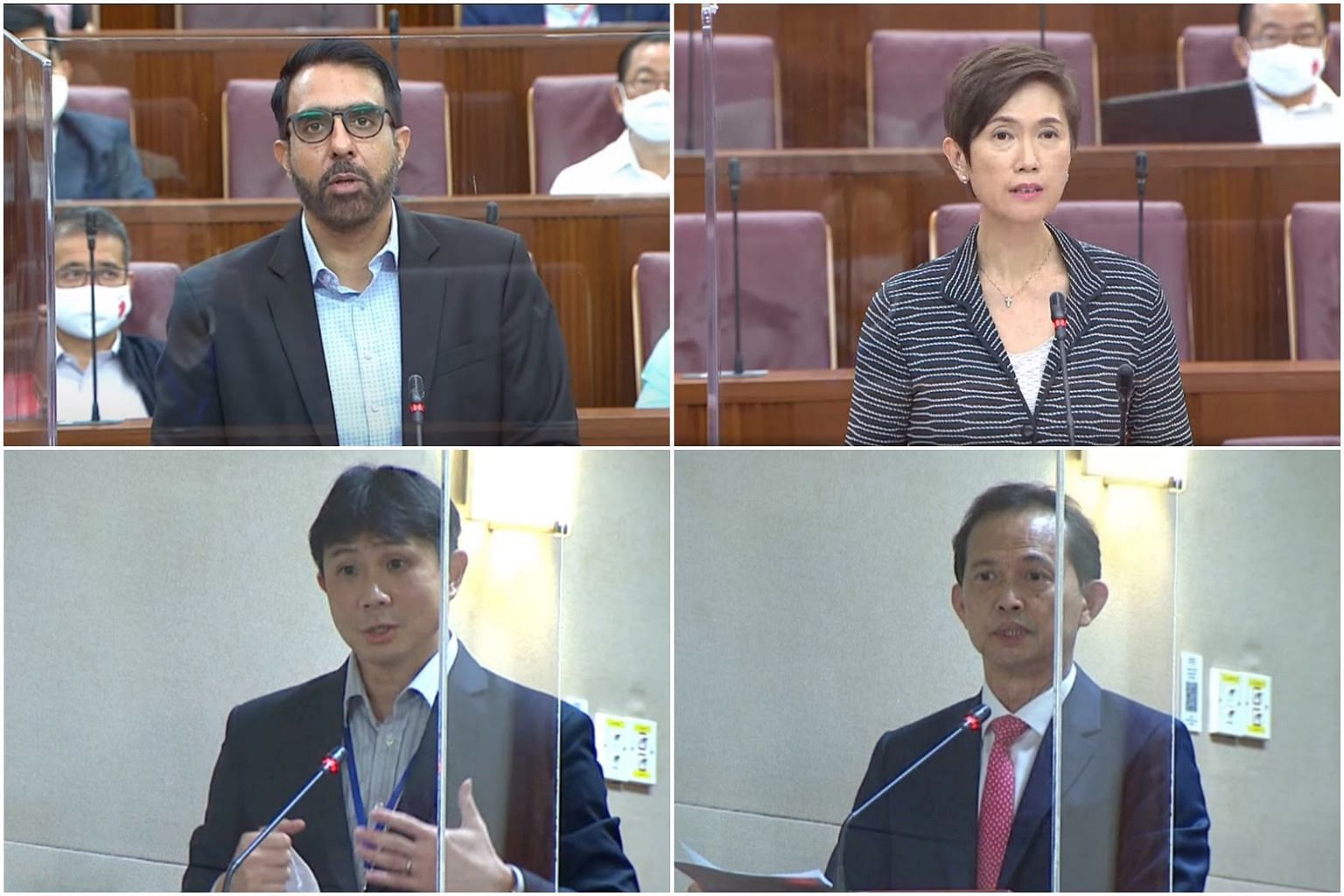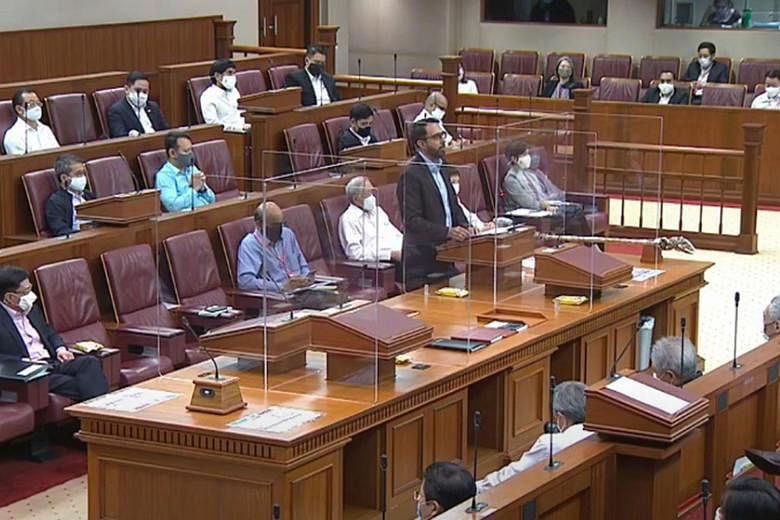SINGAPORE - Prime Minister Lee Hsien Loong on Wednesday (Sept 2) warned against politics in Singapore going down the path of polarisation, which would divide the country and see all issues becoming partisan.
Having an adequate number of opposition MPs in Parliament is good for the country as this keeps the Government on its toes and shows Singaporeans that it has nothing to hide, he said.
But for Singapore's politics to work, the Government and opposition must share the overriding objective of working for Singapore, and not just for their party or supporters, he added.
More opposition MPs and fiercer debate in the House may not necessarily be better, he said, cautioning that the tone of Singapore's political debate could change for the worse.
The adversarial dynamic that is inherent in the parliamentary system can go wrong, he said in setting out why it is crucial for the country to get its politics right during the debate on the President's Address.
While the hope is that diversity will "make a hundred flowers bloom", how does Singapore prevent diversity from producing polarisation, he asked.
"How do we make sure that disagreement does not result in paralysis?"
This has happened in many other countries, he noted, where politics permeates every issue and every subject becomes partisan - even public health issues like whether to wear a mask or not.
"This is my side, and that is yours. There is no middle ground, only sides to take. There are no truths or facts, only different versions of reality - facts and, of equal standing, 'alternative facts'," Mr Lee said. "Politics becomes toxic and bitter. The country is divided, and goes into a downward spiral.
"If this happens to Singapore, we will not just cease being an exceptional nation. It will be the end of us. We must not go down this path," he stressed.
People's Action Party MPs will have to raise their game and be prepared for sharper questioning, defending the Government's policies and decisions while speaking up for their constituents, he said.
Mr Lee called on opposition MPs to also step up and go beyond criticising government proposals to putting up their own ideas to be examined and debated.
On its part, the Government will take an open and constructive approach, he said.
"On the specific details of policies...we will be open-minded, we will listen to the different voices. We can try different schemes, solutions. We will take in all constructive views and perspectives," he said.
But on major issues concerning Singapore's fundamental interests, the Government cannot wait passively for consensus to form, he added.
If there remain different views at the end of a full discussion, it will have to make the decision it judges best, and take responsibility for it, he said. "Having been elected to govern, we must govern."
It is the Government's duty to make such decisions, and be accountable to Singaporeans for them, he added.
However, if the issue is not policies and priorities but a challenge his team's fitness to govern, then the Government will have to stand up and defend itself vigorously, PM Lee said.
"It must put down the challenge and prove that it deserves to be the government," he said. "Because otherwise, it must step aside and let another team take over."
An 'inherently adversarial' democracy

Singapore's Westminster-style democracy, based off the British model, is inherently adversarial, Mr Lee noted.
In Parliament, the leader of the opposition (LO) sits opposite the prime minister, challenging the incumbent and pointing out their faults, he said.
The LO highlights the government's shortcomings and chips away at his opponents' credibility, with the ultimate goal of having his team taking their place in government.
Mr Lee noted that former British leader of the opposition Jeremy Corbyn took on Mr David Cameron in Parliament and, later on, Mrs Theresa May.
Now, Sir Keir Starmer, the Labour Party's new leader, is doing his best to "show up current British PM Boris Johnson, and to make a name for himself".
In Australia, question time for Prime Minister Scott Morrison happens every day when Parliament is sitting, and often lasts more than an hour.
"Every encounter is a gladiatorial contest," Mr Lee said. "Lots of drama and theatre, and prepared soundbites. The wittier, and more contemptuous, the better."
In both these jurisdictions, the prime minister has to "stand his ground, defend his government's policies, and maintain psychological dominance, to show that he deserves to be PM".
"If not, MPs on both sides will sense it, and so will the public, and this will influence election outcomes as well as leadership contests in their parties," Mr Lee said.
In Singapore, the tone of parliamentary debate is less combative and its political traditions have developed differently, he noted.
Opposition MPs are generally more restrained in their style of asking questions, Mr Lee noted, adding: "No doubt it helps that they know if they take a more strident tone, ministers are on top of their briefs and will be more than capable of taking them on."
They have, however, tried from time to time, he said. "Mr Low Thia Khiang was particularly skilled at this."
Mr Lee said he listened closely to Leader of the Opposition Pritam Singh's speech on Monday, describing how he intends to perform his new role.
"I applaud his tone and approach," he said of the Workers' Party chief. "The government benches will do our part to work with him, to keep Parliament a constructive forum for debate."
Debate must be based on principles and facts, he said, and guided by shared ideals and goals.
MPs have to speak up for what they sincerely believe in, and they should be in politics in order to protect Singapore's security, grow the economy and secure the future, he added.
"If we do that, then there is a basis for us to manage the inherent tensions in our system, and for politics to work out productively," Mr Lee said.
What next for Singapore politics?
Ultimately, the type of politics that Singapore has depends on Singaporeans, he said.
Singaporeans have a responsibility to engage in public discourse, send the right signals at the ballot box and reward parties that do the right thing and deliver.
"The standards they demand of political leaders, PAP and opposition, will influence the quality of the political leadership, the level of discussion and debate in Parliament; they will determine whether our politics enables us to thrive and prosper, or divides and destroys us," he said.
The PAP, in particular, has a "special responsibility" to make the system work and provide the leadership that Singapore needs and deserves. This is because it is inextricably linked with Singapore's founding, history and developments, Mr Lee said.
In Singapore, great emphasis is placed on the quality of government - the public service as well as the political leadership, he added.
This, coupled with the trust and support of Singaporeans, enables the country to deal with problems rationally, comprehensively and effectively.
"In Singapore, the PAP government has been able to do the right thing for Singaporeans - sometimes difficult and hard things - and still get re-elected. Sometimes we've paid the price in the vote, but overall we've continued to win elections. And therefore the Government has been able to think long term, well beyond the next general election," Mr Lee said.
As a result, the country progresses, Singaporeans benefit, and the PAP continues to win elections in a "virtuous, self-reinforcing circle".
"This model has worked well for Singapore," PM Lee said. "Once broken, it will be very difficult to put back together again."
He asked if Singapore could continue to work this way, and keep its focus on the long term with more diversity and contestation.
"At what point does a vote for a strong opposition become a vote for a different government?
"Is it really true that one day if there is a change of government, a new party can run Singapore equally well because we have such a good public service, as Mr Pritam Singh suggested on Monday?
"It's like saying you have the New York Philharmonic, anybody can be the conductor."
These questions have no easy answers, and in the nature of politics and human societies, things can and do go wrong, Mr Lee said.
"Each successive generation of Singaporeans has to keep on doing its best to keep the system working right," he said.
"The PAP feels acutely its special responsibility to keep on doing its best for Singapore, and keep Singapore working in this unique way. That is our sacred mission.
"We will do our utmost to persuade good men and women to enter politics, to take over the torch and lead the next generation. We will fight hard to win the hearts and minds of Singaporeans, and show Singaporeans that the PAP continues to deserve their support and trust."


